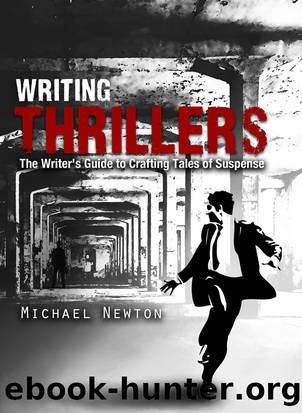Writing Thrillers by Michael Newton

Author:Michael Newton [Newton, Michael]
Language: eng
Format: epub
ISBN: 978-1-5996-3649-8
Publisher: Penguin Publishing Group
Published: 2013-05-15T00:00:00+00:00
Say What?
Much of what we learn in any novelâabout characters, their backgrounds, and their present situationsâis revealed through dialogue. People talk in fiction as they do in real life, with certain reservations. One of your jobs as an author is to write dialogue that advances your story and illuminates your characters without becoming too lifelike.
Confusing? Not really.
Consider how you speak to friends and family, acquaintances, co-workersâanyone at all, in fact. Youâll quickly note that people hem and haw a great deal, lose their train of thought and wind up getting sidetracked, or forget entirely what they meant to say. Small talk and chitchat may fulfill a social purpose in real life, but theyâre the kiss of death in thrillers where you need to keep the action moving forward from one crisis to another, with disaster waiting at the end for a protagonist who fails to beat the ticking clock.
So pare it down, weed out the chaff, and keep your characters on track when writing dialogue, unless an absent-minded player is important to your story. While youâre at it, bear in mind how real-life conversations sound and donât fall prey to certain hackneyed traits of dialogue from Hollywood.
Name-dropping is a case in point. You know what I mean if youâve ever watched a TV soap opera where characters habitually repeat each otherâs names while speaking face to face. Who really does that? Do your readers need to be reminded of the charactersâ names in every third or fourth line on a page? And while weâre on the subject, who incessantly repeats the full name of an absent third party in conversation? Have you seen Jane Smith today? I asked Jane Smith to speak with me before she left! Has Jane Smith already gone home? If you have so many Janes in your story that you canât keep them straight in a short conversation without repeating surnames, go back and read the section above on character naming.
Real people simply donât talk that way. They may use nicknames for each other, but even those arenât commonly repeated time and time again during a single conversation, except to make a pointâas in mockery, for instance, or as a sign of affection. If you think your readers may lose track of who said what to whom in any given scene, make judicious use of dialogue tags (she said, he shouted, etc.).
And speaking of dialogue tags, many editors and writing coaches advise that those also should be used sparingly. On one hand, he said/she said may become monotonous; conversely, use of more colorful alternatives may make it seem that youâre just showing off. (And never use ejaculated during pillow talk, unless youâre playing it for laughs!) In choosing tags, make sure the ones you pick make sense. Does any human being really snort, snarl, chortle, or bark dialogue?
Thrillersâand particularly those involving science or advanced technologyâmay require incorporation of specialized jargon into your dialogue. If you donât share your characterâs training as a physician, pilot, forensic pathologist,
Download
This site does not store any files on its server. We only index and link to content provided by other sites. Please contact the content providers to delete copyright contents if any and email us, we'll remove relevant links or contents immediately.
| Publishing & Books | Research |
| Writing |
Autoboyography by Christina Lauren(4692)
Asking the Right Questions: A Guide to Critical Thinking by M. Neil Browne & Stuart M. Keeley(4627)
Dialogue by Robert McKee(3611)
Eat That Frog! by Brian Tracy(3550)
Sticky Fingers by Joe Hagan(3466)
Journeys Out of the Body by Robert Monroe(3016)
Elements of Style 2017 by Richard De A'Morelli(2953)
Annapurna by Maurice Herzog(2860)
Schaum's Quick Guide to Writing Great Short Stories by Margaret Lucke(2819)
Full Circle by Michael Palin(2793)
The Diviners by Libba Bray(2458)
The Art of Dramatic Writing: Its Basis in the Creative Interpretation of Human Motives by Egri Lajos(2428)
The Mental Game of Writing: How to Overcome Obstacles, Stay Creative and Productive, and Free Your Mind for Success by James Scott Bell(2404)
Why I Write by George Orwell(2378)
Atlas Obscura by Joshua Foer(2359)
In Patagonia by Bruce Chatwin(2287)
The Fight by Norman Mailer(2170)
The Elements of Style by William Strunk and E. B. White(2081)
Venice by Jan Morris(2063)
